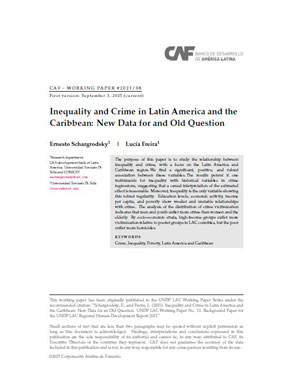Inequality, Crime, and the Long Run Legacy of Slavery
Resumen
This paper investigates the relationship between economic inequality and crime in Colombian municipalities. Following recent scholarly research that suggests that the legacy of slavery is largely manifest in persistent levels of economic inequality, we instrument economic inequality with a census-based measure of the proportion of slaves in each municipality before the abolition of slavery in the 19 century. We also explore the robustness of our estimates to relaxing the exclusion restriction, as the slavery instrument is only plausibly exogenous. We document a strong association between inequality and both violent and property crime rates at the municipal level. Our estimates are robust to including traditional determinants of crime (like population density, the proportion of young males, the average education level, the quality of law enforcement institutions, and the overall economic activity), as well as current ethnic differences and geographic characteristics that may be correlated both with the slave economy and with crime.
Materia
País / Región
Fecha
2016-12-25Citar de esta publicación
Item perteneciente a la Colección
Items Relacionados
Inequality and Crime in Latin America and the Caribbean: New Data for and Old Question
The purpose of this paper is to study the relationship between inequality and crime, with a focus on the Latin America and Caribbean region.We find a ...




